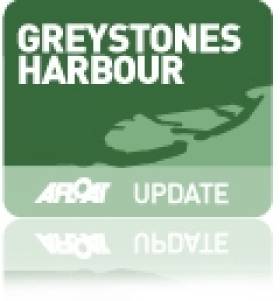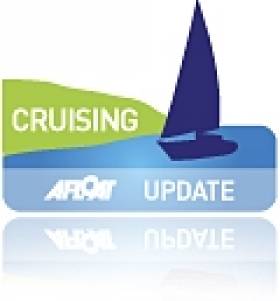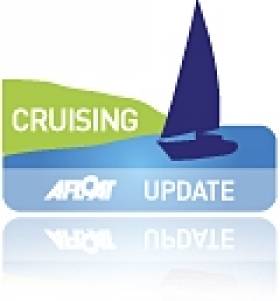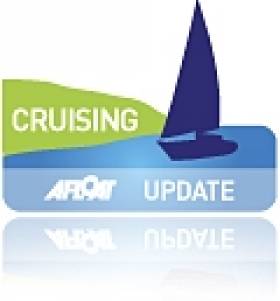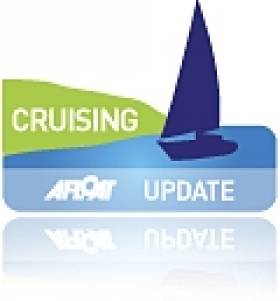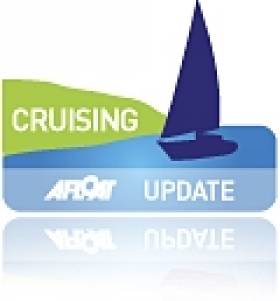Displaying items by tag: Cruising Association
Greystones Harbour & Marina Hosts its First Gathering Cruise
Less than four weeks after opening its initial batch of pontoon berths, Greystones Marina has hosted its first gathering of cruisers with the Cruising Association of Ireland mustering at the new harbour over the weekend of April 27/28 writes WM Nixon.
The severe weather of the Spring of 2013 has delayed many fitting-out programmes, but so keen were CAI members to celebrate the new facility that those whose boats weren't ready joined their Commodore John Leahy at the venue by road.
He was among those who'd sailed down from Dublin Bay with his Moody 33 Eblana to enjoy glorious if cold sunshine on the Saturday, and a fine fair wind off the land to speed them home on Sunday.
The Beach House was the natural venue for the shoreside conviviality, and numbers using Greystones – both as marina residents, and as visitors – will steadily increase as the season gets going.
The Gathering Cruise will call by in July, while the Irish Cruising Club Eastern Region are planning their first major fleet movement to the re-born North Wicklow harbour in late August.
But historically speaking, they'll all be following the Eblana, which is now indisputably in the records as the first leader of the first cruising group to visit Greystones.
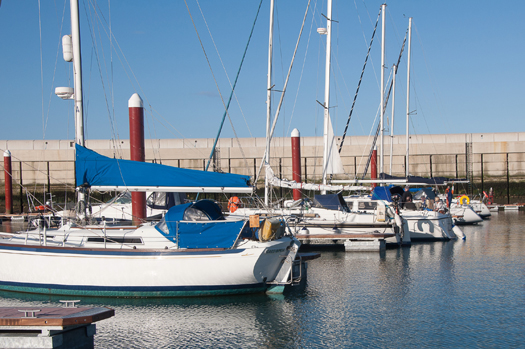
The new marina in Greystones is starting to attract an eclectic fleet of resident boats. Photo: Aidan Coughlan
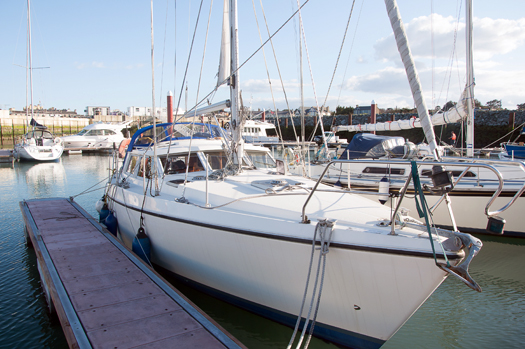
The flagship of the first fleet to Greystones – John Leahy's Moody 33DS Eblana brings the sunshine to North Wicklow. Photo: Aidan Coughlan
Corks Pop for Cruising's 4,000th Member
#CRUISING – On the first day of the London Boat Show the Cruising Association's Patron, Sir Robin Knox-Johnston, welcomed Eric Roberts as the 4,000th member of the Association.
Eric, 57, lives in Shenfield, Essex, and was introduced to the Cruising Association by his sister Eileen and her husband Chris Wintrell who bought Michael Buerk's boat 'Airwaves of London'. "They are quite active CA members and recommended it to me enthusiastically" said Eric. Although Eric has sailed since the age of eight, he is awaiting delivery of his first boat, a Beneteau Oceanis 45, which is due to be launched in March. He plans to sail the new yacht through the Mediterranean from France to Gocek in Turkey. After a year or two, Eric's dream, once he has built up enough experience, is to sail to the Caribbean.
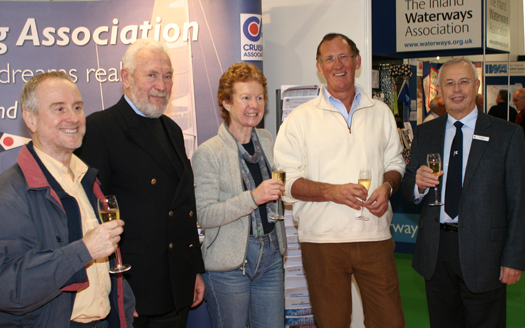
The 4,000th CA Member, Eric Roberts, is welcomed by fellow members (l to r) Paul Chandler, Patron Sir Robin Knox-Johnston, Rachel Chandler, and President Stuart Bradley.
What does Eric hope to gain from membership of the CA? First of all, he points out, his subscription has already more than paid for itself, earning him 5% discount on his annual berth at Gocek. He plans to use the members' website for passage planning information and also has ideas about using the Association's Crewing Service to help him look for crew. "And it will be great to see the burgee on other boats and go over and say hello".
Stuart Bradley, CA President, commented: "Welcoming Eric as the 4000th member is the climax of a very successful 12 months during which the Association increased its membership by a record 14%. We're seeing an increase in the number of UK-based sailors who keep their boats overseas, and also in members who don't have a boat and want to increase their experience by crewing for others."
"For many years the CA has been the cruising world's best kept secret. More people are now realising that we're like a world-wide local yacht club. Through electronic communication, our ever-expanding website, special interest Sections, and a network of Local Representatives in the popular cruising areas of the world, we can provide information and encouragement to cruising sailors wherever they live or cruise. We help to make members' dreams real."
Cruising Association Holds First 2011 Meeting on Dublin Bay
Dinner will be served at 8pm at a reduced cost of only €20 per person, Drinks in the bar, wine available @ €18 per bottle.
The is rally open to all cruising sailors, and there will be a brief presentation of the Strangford Lough cruise in late July.
The Cruising Association AGM will be held in a private room from 1900 – 1930 for CAI members interested in attending.
Latest Cruising news
UK Marinas Calm Fears Over Biofuel
Three of Britain's largest marina operators have moved to quash fears that biofuels will enter the diesel supply, Yachting & Boat World reports.
MDL Marinas, Premier Marinas and Yacht Havens Group have all confirmed they are taking steps to ensure the fuel that reaches their customers is free of fatty acid methyl ester (FAME), a biofuel that is harmful to marine engines.
Premier Marinas have said it will be setting low-sulphur diesel containing up to 2% biofuel until the summer, but is adding Soltron enzyme fuel treatment to all batches and does not anticipate any 'diesel bug' problems.
The news comes after the recent advice from the Cruising Association warning against diesel containing biofuels, following the change in EU regulations for low-sulphur dieself for leisure vessels.
Yachting & Boat World has more on the story HERE.
Marine Diesel 'Must Be FAME-Free'
The Cruising Association has urged boaters to ensure their supplies of diesel are free of bio-fuel that could have harmful effects on marine engines.
Regulations for the new grade of low-sulphur diesel for leisure vessels and yachts were introduced last week. But the Federation of Petroleum Suppliers has warned that a percentage of this fuel may contain fatty acid methyl ester (FAME).
The bio-fuel is used safely in a variety of industries but can have "a seriously detrimental effect on some marine engines" and is known to worsen "the problems of ‘bugs’ in tanks, causing blocked filters [and breaking down] to acids leading to engine equipment damage".
It's understood that Irish marinas are arranging with fuel suppliers to provide them with FAME-free diesel, but some diesel containing up to 2% of the bio-fuel may not be phased out until summer.
The Cruising Association has advised boatowners to demand details from their suppliers regarding the age and sulphur content of their fuel, and whether it contains FAME.
Paal Janson of Dun Laoghaire Marina told Afloat.ie: "We are happy to say that we will continue to supply gas oil [diesel] with no FAME content."
He added: "We have been told by our supplier (Maxol) that their 10ppm gas oil also contains no FAME and the only product they supply with FAME is Derv (road diesel).
"They also inform us that the legislation has still not been signed off by the relevant Government minister. So until advised otherwise, it is business as usual for gas oil supply at Dun Laoghaire Marina."
Cruising Association's MedNet Goes Global
The Cruising Association has just launched a new internet and email based net, which lets members cruising various regions of the world arrange meets, ask questions and receive answers about ever-changing local facilities and regulations.
It all started in 2000 as Mednet, a service for some 85 members cruising yachts and motorboats in the Mediterranean. MedNet 1 allowed one-to-one email communication but soon members wanted more, especially the ability to see the answers to other members' questions.
So MedNet 2 was born in Spring 2001, providing wider access to conversations. By Autumn 2003 MedNet 2 had moved to Yahoo Groups, but as membership increased mail traffic became too heavy for slow and expensive internet connections on boats. As a consequence MedNetLite was introduced for those with low bandwidth connections. By now 250 users were exchanging news about lay-up sites, marinas, restaurants, anchorages, provisioning, boatyards, itineraries and regulatory changes. But a good long-term record of all this data was missing.
So MedNet 3 was introduced in 2006, working as an email based forum within MyCA, the Cruising Association members-only intranet. There were still shortcomings. The system was passive, collecting e-mails and displaying them online. Inputs were only by email. By now, users had grown to 350, 10% of the Cruising Association's membership. Members cruising in other regions began asking for their own networks.
The time had come to upgrade so Version 4 was developed by a group of Cruising Association members with IT skills. This has just been launched for four regions; Mediterranean, Baltic, European Inland Waterways and 'Blue Water'. Members can join as many as they wish. They post and respond online, or by email. They can receive full or lite email messages or opt for no email, just tuning in online when they have Internet access. A full record of all these discussions is maintained online, making it easy to research topics and keep the Cruising Association's many members-only publications right up-to-date.
On MedNet recent discussions have included:
• The need for grey water holding tanks in Turkey
• The cheapest way of making cash withdrawals
• Marina costs in western Italy
• Recommendations for a rigger in Preveza
• How to watch British TV in the Med
• Places for winter storage ashore
It will be interesting to see the sorts of topics that the wider use of MedNet technology brings!
Cruising Association Delighted Members Paul and Rachel Chandler are Safe
The Cruising Association is delighted that members Paul and Rachel Chandler are safe after their ordeal and hopes that they will soon be reunited with friends and family.
President Stuart Bradley says "It has been a truly awful ordeal for Paul and Rachel. They have conducted themselves with extraordinary dignity and bravery in very harsh conditions throughout the 388 days of their capture. The Cruising Association has kept in close touch with representatives of their family throughout and followed their wishes. Many letters of support from Cruising Association members have been forwarded to them. In many instances those letters have been acknowledged personally by family members. I received messages from Paul's sister Jill Marshment, and Rachel's brother Stephen Collett shortly after 6.30 am today informing me of their release but requesting no publicity until Paula and Rachel were safely out of Somalia. I would like to thank the press and news media for showing restraint in covering this story. Soon after Paul and Rachel's capture we were advised that publicity only encourages hostage-takers to believe their ransom demands would be met and that it would delay the release of Paul and Rachel Chandler. We have maintained silence until now in order to support the various attempts to secure their release. We are now free to speak."
Like many thousands of CA members the Chandlers are simply leisure sailors. They left the UK to realise their dream of sailing around the world. That dream turned to a nightmare when, in international waters 600 hundred miles from Somalia, they were taken captive by pirates and held to ransom. Peggie Manton, Secretary of the CA's Mediterranean Section knows the Chandlers well having spent many months sailing with them in the Mediterranean. Peggie says "We are all thrilled at the news that Paul and Rachel have been released and we can't wait to see them safely back home. We can only guess at what they have had to endure but they have come through it bravely and we are all very proud of them."
Cruising Association Patron, Sir Robin Knox-Johnston CBE says "I am very pleased to hear that Paul and Rachel are safe. It has been a truly dreadful time for them and we look forward to welcoming them back home. I, in common with all of the Cruising Association's members, have been waiting for this news and we cannot say how pleased we are to hear that they are at last safe and will shortly be on their way home. The growing threat of piracy is something all governments must work towards combating."
Stuart Bradley, CA President says "We work closely with the UK Ministry of Defence, the Foreign and Commonwealth Office and The Maritime Security Centre (Horn of Africa) part of the EU Naval Force, to reduce the risk of piracy to innocent yachtsmen. We will continue to do everything we can to make the seas safe for everyone who wants to sail on them. There is a crying need for international intervention to deal with the background issues in Somalia, and the problem of piracy in that area is not likely to be resolved until stability and a sound economy can be introduced."



























